|
|
|
Sort Order |
|
|
|
Items / Page
|
|
|
|
|
|
|
| Srl | Item |
| 1 |
ID:
193826


|
|
|
|
|
| Summary/Abstract |
Established as a multilateral development bank (MDB) funded by African states, the African Development Bank (AfDB) is one of many similar international organizations (IO s) comprising the development finance regime complex. Arguably, states and policy elites recreate similar IO s that enable “norm conformance” within the complex. This is demonstrated through the AfDB’s adoption of the Independent Recourse Mechanism (IRM) in 2004. Despite no need or demand, the relatively insulated AfDB agreed to provide recourse for people adversely affected by AfDB-financed projects. This article argues that consensus among state and nonstate actors around an accountability policy norm led the AfDB to conform. Nonregional Member States, particularly the United States, used typical norm diffusion mechanisms: financial incentives, normative suasion, and voting on the AfDB’s Board. The concept of norm conformance highlights how behavioral expectations and organizational practices change based on what is socially appropriate.
|
|
|
|
|
|
|
|
|
|
|
|
|
|
|
|
| 2 |
ID:
188210
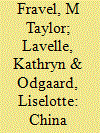

|
|
|
|
|
| Summary/Abstract |
As global warming accelerates the melting of Arctic ice, opportunities for new transport routes open along with new strategic interests. This article examines how China pursues its interests in the Arctic and, specifically, the degree to which it seeks to work through the existing regime complex versus engaging in bilateral cooperation with Arctic states. China’s willingness to work through the regime complex or use bilateral cooperation depend on the specific issue. We find that China relies on global regimes regarding navigation issues, prefers bilateral cooperation for purposes of resource extraction, and prioritizes Arctic regimes to justify the pursuit of dual-use scientific research. We conclude that as a great power, China is well-positioned to use institutional complexity to its advantage. China uses existing regimes when it benefits Chinese interests, supplemented by bilateral initiatives as appropriate.
|
|
|
|
|
|
|
|
|
|
|
|
|
|
|
|
| 3 |
ID:
190217


|
|
|
|
|
| Summary/Abstract |
While many have observed a regime complex for global clean energy governance, research has not yet accorded sufficient attention to the interplay of multiple streams of politics that have led to the structuring of overlapping governance initiatives and, ultimately, the articulation of a set of norms that hold this regime complex together. To understand these dynamics, this article argues that with the visibly increased agency of transnational actors and international organizations, four mechanisms together are likely to shape regime complexity: divergent state preferences, the agency of transnational actors, practices of intergovernmental organizations, and interorganizational recognition and normative legitimation. Drawing on a qualitative analysis of policy documents and interviews, and a social network analysis, it studies global clean energy governance from 1980 to 2014 to illuminate these dynamics. The findings suggest that the combination of these four mechanisms can explain the evolution from a nonregime to a loosely coupled governance system for clean energy.
|
|
|
|
|
|
|
|
|
|
|
|
|
|
|
|
| 4 |
ID:
117946
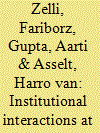

|
|
|
|
|
| Publication |
2013.
|
| Summary/Abstract |
This article argues that institutional interactions that cut across the domains of trade and environment are embedded in overarching norms that shape their evolution and impact. In making this argument, it analyzes three cases of such interactions within the climate change and biosafety regime complexes: those relating to trade-related climate policies and measures, forest carbon sinks, and trade in genetically modified organisms. The analysis highlights the dominance of liberal environmentalism (a set of global norms promoting economic efficiency and environmental improvements through market-based mechanisms) in shaping institutional interactions within these regime complexes, even as liberal environmentalism is contested by key actors. This, in turn, has implications for effective management of institutional interlinkages within regime complexes in global environmental governance.
|
|
|
|
|
|
|
|
|
|
|
|
|
|
|
|
| 5 |
ID:
117945
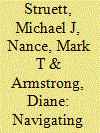

|
|
|
|
|
| Publication |
2013.
|
| Summary/Abstract |
Maritime piracy is one of the oldest subjects of international law and recently it has reemerged as a serious threat to commerce and security. While states have become more engaged in punishing and preventing piracy, efforts as a whole have been poorly organized, ad hoc, mostly unilateral, slow to develop, and only minimally effective. This is true despite the existence of a regime complex that supposedly promotes effective cooperation on the issue. What explains the insufficient response to this rising economic and security threat? This article argues that the regime complex itself is a major part of the problem. It examines specifically four core elemental regimes that are identifiable by their key texts or organizations: the UN Convention on the Law of the Sea, the Convention for the Suppression of Unlawful Acts Against the Safety of Maritime Navigation, the International Maritime Organization, and the International Maritime Bureau. This analysis adopts a perspective that emphasizes how these different legal and organizational institutions shape actors' understandings of piracy, and thus their interests in it, in conflicting ways. Different elemental regimes push different actors toward different behaviors.
|
|
|
|
|
|
|
|
|
|
|
|
|
|
|
|
| 6 |
ID:
105363


|
|
|
|
|
| Publication |
2011.
|
| Summary/Abstract |
There is no integrated regime governing efforts to limit the extent of climate change. Instead, there is a regime complex: a loosely-coupled set of specific regimes. We describe the regime complex for climate change and seek to explain it, using interest-based, functional, and organizational arguments. This institutional form is likely to persist; efforts to build a comprehensive regime are unlikely to succeed, but experiments abound with narrower institutions focused on particular aspects of the climate change problem. Building on this analysis, we argue that a climate change regime complex, if it meets specified criteria, has advantages over any politically feasible comprehensive regime. Adaptability and flexibility are particularly important in a setting-such as climate change policy-in which the most demanding international commitments are interdependent yet governments vary widely in their interest and ability to implement them. Yet in view of the serious political constraints, both domestic and international, there is little reason for optimism that the climate regime complex that is emerging will lead to reductions in emissions rapid enough to meet widely discussed goals, such as stopping global warming at two degrees above pre-industrial levels.
|
|
|
|
|
|
|
|
|
|
|
|
|
|
|
|
| 7 |
ID:
117940


|
|
|
|
|
| Publication |
2013.
|
| Summary/Abstract |
Understanding the impact ofregime complexes on global governance calls
for creative policy thinking. This introduction provides a new and more
precise definition of the concept of regime complex. It also suggests specific tools to characterize regime complexes and analyze their impacts on
global governance. The articles in this issue deepen the analytical understanding of complexes by examining concrete examplesin various domains
of global governance such as piracy, taxation, energy, food security, emissions reduction, carbon sinks, biosafety, and refugee governance. In addition to providing an in-depth description of a variety of different regime
complexes, this issue is innovative on three accounts: (1) it presents complexes as both barriers and opportunities for global governance and gives
explanations for these diverse outcomes; (2) it shows how a broad spectrum of actors is necessary for understanding the creation and evolution
of complexes; and (3)it qualifiesformer claimsto the effectthat only powerful actors can impact regime complexes. institutional density.
|
|
|
|
|
|
|
|
|
|
|
|
|
|
|
|
| 8 |
ID:
170313


|
|
|
|
|
| Summary/Abstract |
Regime complex has been widely recognized in many governance issues, but the evolutionary dynamics in regime complex are largely overlooked. This article explores the evolutionary dynamics by conducting a case study on the regime complex for human genetic data, which has evolved as an alternation between stable and unstable periods, known as punctuated equilibrium. Given that existing theories fail to explain the evolutionary pattern, a multiactor analysis framework is set up with the core argument that the evolution of regime complex is shaped by interactions between governance issues outside the regime complex, and a combination of actor power and institutional logics within them. Besides its specific contribution to the literature on regime complex, this article has general implications for research in global governance.
|
|
|
|
|
|
|
|
|
|
|
|
|
|
|
|
| 9 |
ID:
117944
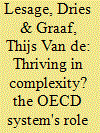

|
|
|
|
|
| Publication |
2013.
|
| Summary/Abstract |
The purpose of this article is to reveal how two organizations from the OECD system-the Organisation for Economic Co-operation and Development and the International Energy Agency-are maneuvering strategically to retain their focal places in the regime complexes that developed around taxation and energy, respectively. It argues that their bid for leadership and centralization is built on the comparative advantages they enjoy as institutions; namely, their historically accumulated expertise and distinct working methods, their close ties with the Group of 8, and their rapidly developing relationships with emerging powers. Notwithstanding these institutional assets, a revision of the OECD's membership could further cement and legitimize the central role of the OECD system in these regime complexes.
|
|
|
|
|
|
|
|
|
|
|
|
|
|
|
|
| 10 |
ID:
142034
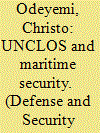

|
|
|
|
|
| Summary/Abstract |
This Critical Comment seeks to situate the United Nations Convention on the Law of the Sea (UNCLOS) within the context of South China Sea (SCS) dispute. Bearing in mind that maritime actions of the main disputants – China, Vietnam, and the Philippines – increasingly “securitise” these long-standing disputes and vice versa, the study examines the concept of a maritime “regime complex.” Whereas efforts have being made to examine UNCLOS and indeed the dispute within the framework of a maritime “regime complex,” the key finding shows that the increased “securitisation” of the disputes makes it difficult to envisage effective engagement of UNCLOS as a resolution mechanism. It will also reveal that China's firmly established expansionist agenda in the SCS region is indicative of Beijing's susceptibility to compromise a diplomatic solution to these long-standing disputes. These discoveries are structured around the knowledge that the spatial relation of the SCS critically espouses not only its geo-strategic significance in terms of natural resources endowment, but also the enduring maritime disputes within the region.
|
|
|
|
|
|
|
|
|
|
|
|
|
|
|
|
| 11 |
ID:
184644
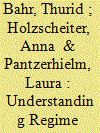

|
|
|
|
|
| Summary/Abstract |
How do regime complexes as social orders affect relations among international organizations (IO s)? This article explores this question by studying the longitudinal development of interorganizational practices and the social meanings attached to these practices that constitute a regime complex. Adopting a practice lens, our analysis redirects scholarly attention from rationalist accounts of strategic interactions between IO s to the study of patterned “doings” among actors in regime complexes. The mixed-methods analysis of interorganizational practices between eight IO s in the global health regime complex shows that cooperation among IO s is not primarily the outcome of rational responses to problems of collective action. Rather, IO s engage in similar types of practices because they want to be considered “good” IO s that follow a repertoire of habitual and appropriate practices. In turn, interorganizational practices create social meanings that constrain IO s. The approach put forward in this paper demonstrates the ordering effect of practices on the global health regime complex.
|
|
|
|
|
|
|
|
|
|
|
|
|
|
|
|
|
|
|
|
|